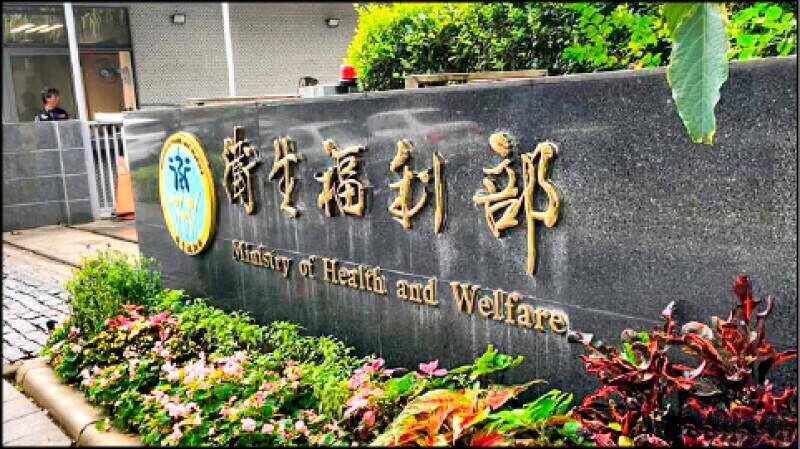The eligibility for National Health Insurance (NHI)-covered spinal muscular atrophy (SMA) treatment would be expanded starting today, and is expected to cover about 90 percent of people with SMA, the Ministry of Health and Welfare said yesterday.
About 400 people in Taiwan have SMA, a rare genetic disease affecting motor neurons, nerve cells mainly in the spinal cord that control voluntary muscle movement. The disease causes progressive weakness and atrophying of muscles.
People with SMA, their families and pharmaceutical companies had urged the National Health Insurance Administration (NHIA) to expand the eligibility of the NHI’s coverage of SMA treatments to all affected.

Photo: Lin Chih-yi, Taipei Times
The health ministry in early March announced that it would ease restrictions for receiving NHI-covered SMA treatments this year, adding that the policy would commemorate the late human rights lawyer Chen Chun-han (陳俊翰), who had SMA and advocated for SMA patients’ right to affordable treatment. He died in February.
Three types of medicines are primarily used to treat SMA, including an intrathecal injection into the spine every few months, a daily oral medication and a one-time gene therapy treatment.
NHIA Medical Review and Pharmaceutical Benefits Division head Huang Yu-wen (黃育文) yesterday said the change in eligibility is for the spinal injection and the oral medication, which had similar eligibility criteria.
The eligibility has been expanded to include people who experienced the onset of symptoms at age 18 or younger, removes the requirement of Revised Upper Limb Module assessment score of 15 or higher and allows people to change their medication once if they have an intolerance to a drug, Huang said.
People with SMA can choose between a spinal injection or oral medication covered by the NHI, but considering the possibility of drug intolerance, they can switch to the other type once in their lifetime, she said.
Under the previous eligibility, only about 140 of the affected people in Taiwan met the criteria for NHI-covered spinal injection or oral medication, but the expanded eligibility is expected to cover treatment for about 250 more people.
The estimated medical expense for the policy in the first year would be about NT$2 billion (US$60.91 million) — an average of NT$6.6 million per patient per year.
Meanwhile, the health ministry earlier this month announced that it would expand a government-funded mental health counseling program, offering three free counseling sessions to people aged 15 to 30.
The program, launched in August last year, would be from today available to people aged 15 to 45.
In addition, starting today, a prescription drug refill limit would be expanded for crew members of long-distance fishing or international shipping vessels, whose chronic disease condition is stable, receive the same prescription drugs each refill and are also scheduled to leave within a month for maritime work for 90 days or longer, the ministry said.
The crew members would be allowed to refill their prescription drug for chronic disease for up to 180 days, and refills of prescription drugs for more than 180 days would also be allowed for special circumstances approved by the NHIA.

Left-Handed Girl (左撇子女孩), a film by Taiwanese director Tsou Shih-ching (鄒時擎) and cowritten by Oscar-winning director Sean Baker, won the Gan Foundation Award for Distribution at the Cannes Critics’ Week on Wednesday. The award, which includes a 20,000 euro (US$22,656) prize, is intended to support the French release of a first or second feature film by a new director. According to Critics’ Week, the prize would go to the film’s French distributor, Le Pacte. "A melodrama full of twists and turns, Left-Handed Girl retraces the daily life of a single mother and her two daughters in Taipei, combining the irresistible charm of

A Philippine official has denied allegations of mistreatment of crew members during Philippine authorities’ boarding of a Taiwanese fishing vessel on Monday. Philippine Bureau of Fisheries and Aquatic Resources (BFAR) spokesman Nazario Briguera on Friday said that BFAR law enforcement officers “observed the proper boarding protocols” when they boarded the Taiwanese vessel Sheng Yu Feng (昇漁豐號) and towed it to Basco Port in the Philippines. Briguera’s comments came a day after the Taiwanese captain of the Sheng Yu Feng, Chen Tsung-tun (陳宗頓), held a news conference in Pingtung County and accused the Philippine authorities of mistreatment during the boarding of

88.2 PERCENT INCREASE: The variants driving the current outbreak are not causing more severe symptoms, but are ‘more contagious’ than previous variants, an expert said Number of COVID-19 cases in the nation is surging, with the Centers for Disease Control (CDC) describing the ongoing wave of infections as “rapid and intense,” and projecting that the outbreak would continue through the end of July. A total of 19,097 outpatient and emergency visits related to COVID-19 were reported from May 11 to Saturday last week, an 88.2 percent increase from the previous week’s 10,149 visits, CDC data showed. The nearly 90 percent surge in case numbers also marks the sixth consecutive weekly increase, although the total remains below the 23,778 recorded during the same period last year,

The Chinese Communist Party (CCP) is pushing for residents of Kinmen and Lienchiang counties to acquire Chinese ID cards in a bid to “blur national identities,” a source said. The efforts are part of China’s promotion of a “Kinmen-Xiamen twin-city living sphere, including a cross-strait integration pilot zone in China’s Fujian Province,” the source said. “The CCP is already treating residents of these outlying islands as Chinese citizens. It has also intensified its ‘united front’ efforts and infiltration of those islands,” the source said. “There is increasing evidence of espionage in Kinmen, particularly of Taiwanese military personnel being recruited by the